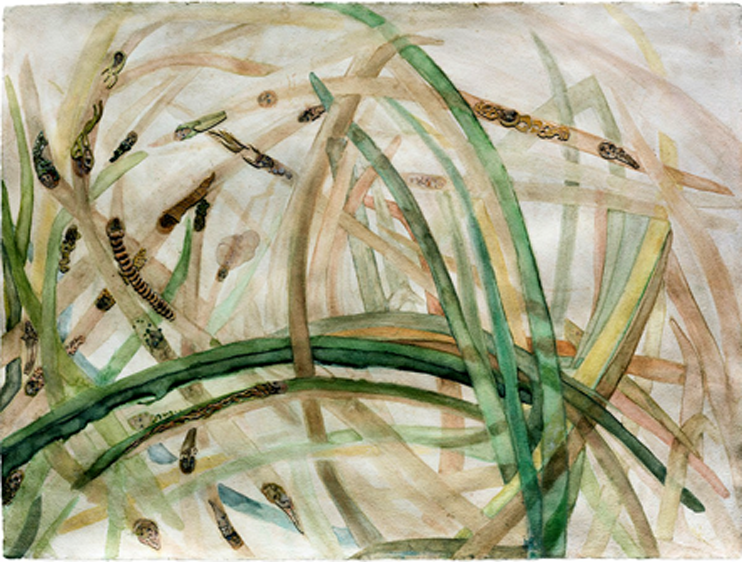Waterborne
After Ellen Gallagher’s Watery Ecstatic
Often I am permitted to return to a meadow
as if it were a given property of the mind…
—Robert Duncan
 As now, this meadow of seagrass, tangle
of history—a nest of myriad,
mirrored faces. How not to think of words
like cargo and jettison, each syllable
a last breath, vesicles rising to the surface
of the sea. How not to think of loss,
how it takes hold and grows: like lacuna
snails, slow and deliberate, on a reed?
Why is everything I see the past
I’ve tried to forget? In dreams
I am a child again, underwater, my limbs
sluggish as I struggle to wake. Always,
I am pursued. Waking, I am frightened
with memory: my mother’s last words
spoken—after her death—in a dream:
Do you know what it means
to have a wound that never heals?
And now this thirst:
how many times have I cupped my hands
to drink, found—in the map
of my palms—the same pattern: lines
crossed and capillary as veins
in the body, these willowy reeds?
How can I see anything
but this: how trauma lives in the sea
of my body, awash in the waters
of forgetting. In every resilient blade
I see the ancestors, my mother’s face.
As now, this meadow of seagrass, tangle
of history—a nest of myriad,
mirrored faces. How not to think of words
like cargo and jettison, each syllable
a last breath, vesicles rising to the surface
of the sea. How not to think of loss,
how it takes hold and grows: like lacuna
snails, slow and deliberate, on a reed?
Why is everything I see the past
I’ve tried to forget? In dreams
I am a child again, underwater, my limbs
sluggish as I struggle to wake. Always,
I am pursued. Waking, I am frightened
with memory: my mother’s last words
spoken—after her death—in a dream:
Do you know what it means
to have a wound that never heals?
And now this thirst:
how many times have I cupped my hands
to drink, found—in the map
of my palms—the same pattern: lines
crossed and capillary as veins
in the body, these willowy reeds?
How can I see anything
but this: how trauma lives in the sea
of my body, awash in the waters
of forgetting. In every resilient blade
I see the ancestors, my mother’s face.